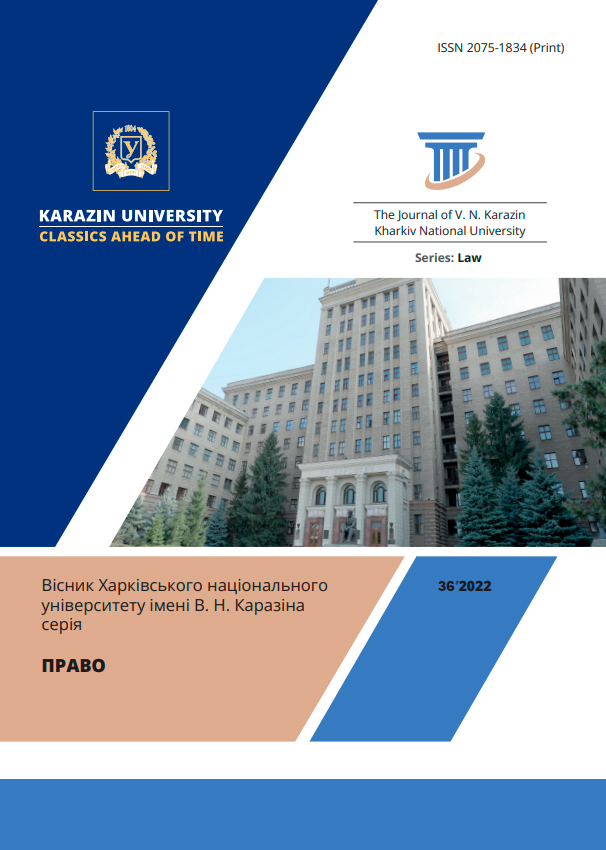Transformation of the subject composition of criminal proceedings and its influence on the development of criminal tactics
Abstract
Introduction. The problem of providing scientifically based forensic recommendations to the activities of criminal justice bodies and other participants in criminal proceedings has been of interest to scientists since the very beginning of the emergence of this type of social activity (criminal procedural). At the same time, the development of scientific provisions depends not only on the actual accumulation of knowledge based on the results of conducted research, but also on changes in criminal procedural legislation. This judgment also applies to the definition of vectors for the development of forensic tactics, which is designed to provide scientifically based practical recommendations regarding the most optimal ways of implementing certain procedural actions by participants in criminal proceedings. The purpose of the work, in particular, is to highlight the existing dependence between the change in the subject composition of criminal proceedings and the further development of forensic tactics, the need to expand its knowledge. During the research, a variety of both general scientific and special methods were used: analysis, synthesis, deduction, induction, comparative method, formal-dogmatic and comparative-legal.
Summary of the main results of the study. It has been determined that the problem of developing the tactics of the activities of those subjects of criminal procedural activity that were introduced into criminal proceedings in connection with the adoption of the Criminal Procedure Code of 2012, in particular: the investigating judge, the detective and the investigator, remains relevant and unresolved. Further development of forensic knowledge in this direction will take place within the framework of such sub-fields of forensic tactics as investigative and judicial.
Conclusions. The development of criminal procedural legislation, in particular, associated with the emergence of new subjects of criminal procedural activity, leads to the emergence of new vectors for the development of forensic tactics. At present, one of the most promising areas of scientific research should be considered to be the development of the tactics of the detective, inquirer, and investigating judge. Regarding the determination of the place of new scientific provisions in the structure of forensic tactics, in our opinion, it is premature to talk about the possibility of forming new sub-branches of it. The tactics of the detective and inquirer can develop within the framework of investigative tactics, and the tactics of the court judge, respectively, within the tactics of the court. Such a conclusion is connected with the fact that functionally the activity of conditionally new subjects is equal to the activity of the investigator and the court, although they have their own specifics.
Downloads
References
/References
Бахин В.П. Криминалистика. Проблемы и мнения (1962–2002): монография. Киев: Охрана труда, 2002. 268 с.
Криміналістика: підручник / Кол. авт.: В. Ю. Шепітько, В. О. Коновалова, В. А. Журавель та ін. / За ред. проф. В. Ю. Шепітька. 4-е вид., перероб. і доп. Харків: Право, 2008. 464 с.
Кримінальний процесуальний кодекс України: Закон України від 13.04.2012 р. № 4651-VI. Відомості Верховної Ради України. 2013. № 9-10. Ст. 474.
Попелюшко В.О. Слідчий суддя у кримінальному провадженні. Часопис Національного університету «Острозька академія». Серія «Право». 2014. № 1 (9). С. 1–30.
Шевчук В.М. Сучасне розуміння криміналістичної тактики: поняття, ознаки, предмет і завдання. Теорія і практика правознавства. 2020. Вип. 1 (17). С. 1–30. DOI: https://doi.org/10.21564/2225-6555.2020.17.206490
Шевчук В.М. Засоби криміналістичної тактики: поняття та система. Актуальні проблеми правознавства. 2020. № 2 (22). С. 166–180. DOI: https://doi.org/10.35774/app2020.02.166
Шепітько В. Ю. Криміналістична тактика (системно-структурний аналіз): монографія. Харків: Харків юридичний, 2007. 432 с.
Bakhin V.P. Criminalistics. Problems and opinions (1962–2002): monograph. Kyiv: Labor protection, 2002. 268 p. ( in Ukrainian).
Forensics: a textbook / Author team: V.Yu. Shepitko, V.O. Konovalova,
V.A. Zhuravel, and others. / Under the editorship Prof. V.Yu. Shepitka. 4th ed., revision. and additional Kharkiv: Pravo, 2008. 464 p. ( in Ukrainian).
Criminal Procedural Code of Ukraine: Law of Ukraine dated April 13, 2012 No. 4651-VI. Bulletin of the Verkhovna Rada of Ukraine. 2013. No. 9-10. Art. 474. ( in Ukrainian).
Popelushko V.O. Investigating judge in criminal proceedings. Journal of the National University "Ostroh Academy". "Law" series. 2014. No. 1 (9). P. 1–30. ( in Ukrainian)
Shevchuk V.M. Modern understanding of forensic tactics: concepts, signs, subject and tasks. Theory and practice of jurisprudence. 2020. Issue 1 (17). P. 1–30. DOI: https://doi.org/10.21564/2225-6555.2020.17.206490 ( in Ukrainian)
Shevchuk V.M. Means of forensic tactics: concept and system. Actual problems of jurisprudence. 2020. No. 2 (22). P. 166 - 180. DOI: https://doi.org/10.35774/app2020.02.166 ( in Ukrainian).
Shepitko V. Yu. Forensic tactics (system-structural analysis): monograph. Kharkiv: Kharkiv Legal, 2007. 432 p. ( in Ukrainian).
Copyright (c) 2023 Ольга Шайтуро

This work is licensed under a Creative Commons Attribution 4.0 International License.




